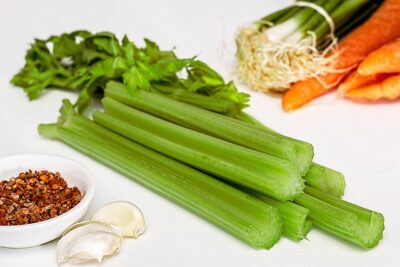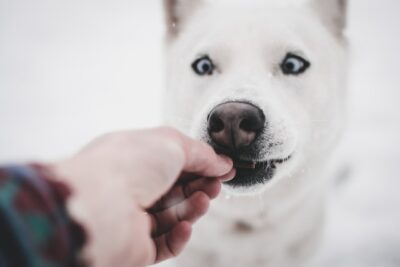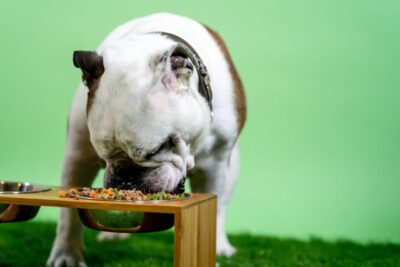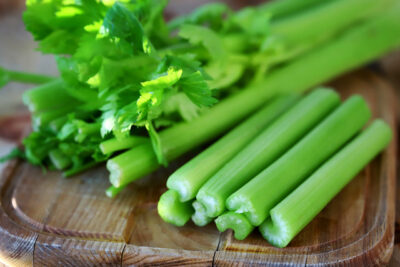Overview
Introduction: Can Dogs Eat Celery

The Curiosity About Dogs’ Diets
In the world of pet parenting, there’s often a whirlwind of questions regarding our furry friends’ dietary habits. One common query that pet owners often ponder is whether it’s safe for dogs to consume celery.
In this comprehensive guide, we’ll dive deep into the topic of dogs and celery consumption to provide you with all the essential information you need.
Purpose of This Guide
The purpose of this guide is to address the curiosity surrounding furry friends’ diets, specifically focusing on celery as a potential addition.
We’ll explore the nutritional value, health benefits, risks, and best practices for incorporating celery into your dog’s diet. By the end, you’ll have a clear understanding of whether celery is a suitable treat for your canine companion.
Importance of Dog Nutrition
Before delving into the details, it’s crucial to emphasize the significance of proper nutrition for dogs. Just like humans, dogs require a well-balanced diet to maintain their overall health and well-being.
What they eat directly impacts their energy levels, immune system, and longevity. Therefore, making informed decisions about their food choices is a fundamental responsibility for pet parents.

Understanding Celery
What is Celery?
Celery, scientifically known as Apium graveolens, is a crunchy green vegetable that belongs to the Apiaceae family. It’s characterized by long, fibrous stalks and vibrant green leaves.
People often consume celery as a low-calorie snack or use it as an ingredient in various dishes.
Nutritional Value of Celery
When it comes to human nutrition, celery is celebrated for its low-calorie content and high water percentage. It’s a good source of dietary fiber, vitamins (such as Vitamin K and Vitamin A), and minerals (including potassium and folate).
These attributes make celery a popular choice for those looking to maintain a healthy diet.
Health Benefits for Humans
For humans, celery offers a range of health benefits, including improved digestion, hydration, and potential weight management support. The crunchy texture of celery makes it a satisfying snack, often enjoyed with toppings like peanut butter and raisins in the classic “ants on a log” treat.

Dogs’ Dietary Needs
Canine Nutritional Requirements
Dogs have specific nutritional requirements that differ from those of humans. Their diet should primarily consist of protein, fats, carbohydrates, vitamins, and minerals to ensure their health and vitality.
As responsible pet owners, it’s vital to provide a balanced diet that meets these needs.
Balanced Diet for Dogs
A balanced diet for dogs includes high-quality commercial dog food or homemade meals that are formulated to meet their nutritional needs. Treats, including fruits and vegetables like celery, can be part of their diet as long as they are given in moderation.

Can Dogs Eat Celery?
Yes or No? Clarifying the Myth
Now, the million-dollar question: Can dogs eat celery? The answer is a resounding yes! Celery is safe for dogs when served in appropriate portions and prepared correctly.
Celery as a Low-Calorie Snack
One of the perks of feeding celery to your dog is its low-calorie nature. This means you can offer it as a healthy, guilt-free treat that won’t contribute to excess weight gain.
Potential Health Benefits for Dogs
In addition to being a low-calorie snack, celery can offer some health benefits to dogs. It contains essential vitamins and beneficial nutrients that can support your dog’s overall health, including healthy skin and proper blood clotting.
Nutritional Analysis
Nutrients in Celery
To better understand the nutritional value of celery for dogs, let’s break down its key components:
- Fiber: Celery is rich in dietary fiber, which aids in digestion and can help with regular bowel movements.
- Vitamins: Celery contains various vitamins, including Vitamin K, which plays a role in blood clotting, and Vitamin A, essential for vision and immune health.
- Minerals: The vegetable provides minerals like potassium, which is crucial for maintaining proper muscle function, and folate, important for cell division.
How Celery Fits into your furry friend’s diet
While celery contains valuable nutrients, it should be viewed as a complementary addition to your dog’s regular food rather than a meal replacement. It can be incorporated as a crunchy veggie and nutritious snack.

Risks and Concerns
Choking Hazard
One concern when feeding your dog celery is the risk of choking. Celery stalks can be stringy and tough, making them a potential choking hazard, especially for small dogs.
To mitigate this risk, it’s advisable to cut celery into bite-sized pieces.
Digestive Issues
Another consideration is digestive upset. Some dogs may experience gas or diarrhea if they consume large amounts of celery.
As such, it’s important to introduce celery slowly and monitor your dog’s reaction.
Allergies
Like any food, celery can trigger allergies in some dogs. Signs of celery allergies may include itching, swelling, or digestive distress. If you suspect your dog is allergic, consult with a veterinarian.

Preparing Celery for Dogs
Prepare Celery Safely to Your Dog
To ensure the safety of your dog when feeding celery, follow these guidelines:
- Wash celery thoroughly to remove any pesticides or contaminants.
- Remove the strings by peeling the celery or breaking it into smaller, more manageable pieces.
- Avoid adding salt, spices, or other harmful seasonings.
Serving Sizes
When introducing celery, start with small portions and observe how your dog reacts. Gradually increase the serving size if there are no adverse effects.
Avoiding Harmful Additions (Salt, Spices, etc.)
It’s essential to steer clear of adding salt, spices, or seasonings to celery when sharing it with your dog. These additives can be harmful to their health.
Signs of Celery Allergies
Recognizing Allergic Reactions
If your dog exhibits signs of celery allergies, such as itching, swelling, or digestive issues, discontinue feeding it immediately.
What to Do in Case of Allergies
If you suspect your dog has celery allergies, consult your veterinarian for guidance. They can help determine the cause of the reaction and recommend suitable alternatives.
Moderation and Frequency
How Often Can Dogs Have Celery?
While celery can be a healthy addition to your pet’s diet, it should be offered in moderation. A small handful of bite-sized chunks a few times a week is generally sufficient.
Portion Control
Remember that celery should only be a part of your dog’s overall diet. Keep track of their daily calorie intake to ensure they receive the appropriate amount of nutrients.
Benefits of Celery for Dogs
Dental Health
The crunchy texture of celery can help promote dental health by reducing plaque buildup and freshening breath.
Weight Management
As a low-calorie snack, celery can be a helpful addition to a pet’s diet, particularly for those working to lose weight.
Hydration
Celery’s high water content can contribute to your dog’s hydration, especially on hot days.
Special Considerations
Puppies and Celery
Puppies have sensitive digestive systems, so it’s best to wait until they are a bit older before introducing celery into their diet. Start with very small portions and monitor their response to ensure it agrees with their stomach because giving too much at once can lead to an upset stomach.
Senior Dogs
Senior dogs may have specific dietary needs or sensitivities, so consult your veterinarian before incorporating celery into their diet.
Overweight Dogs
For overweight canines, celery can be a valuable snack option due to its low-calorie content. However, remember to factor the calories from celery into their daily intake to support weight management.

Alternatives to Celery
Dog-Friendly Vegetables
If your dog doesn’t take a liking to celery or if you’re looking to diversify their diet, consider other dog-friendly vegetables like carrots, cucumber slices, or green beans.
Fruit Treats
In addition to vegetables, dogs can enjoy occasional fruit treats such as apple slices (without seeds) or blueberries. Be cautious with fruit treats due to their natural sugars.
Popular Dog Food with Celery
Commercial Dog Foods
Some commercial dog food brands incorporate celery into their formulations, adding a hint of nutrition and flavor to your dog’s meals. Check product labels for details.
Homemade Recipes
If you prefer preparing meals for your dog at home, there are numerous homemade dog food recipes that include celery. Ensure these recipes are nutritionally balanced.

Monitoring Your Dog’s Health
Observing the Effects of Celery on the Diet
After introducing celery into your pet’s diet, pay close attention to any changes in their health, behavior, or digestive patterns.
This will help you gauge how well they tolerate celery.
Consultation with a Veterinarian
If you have any concerns or questions about your furry friend’s diet, it’s always advisable to consult with a veterinarian.
They can offer personalized guidance based on your dog’s unique needs.
Frequently Asked Questions (FAQs)
Can Celery Be a Regular Part of My Dog’s Diet?
- Celery can be part of your pup’s diet, but it should be offered in moderation as an occasional treat, not a daily staple.
How Should I Introduce Celery to My Dog?
- Start by offering small, bite-sized pieces of celery and observe their reaction. Gradually increase the portion size if your dog tolerates it well.
Are There Other Vegetables can Dogs Safely Eat?
- Yes, dogs can safely consume a variety of vegetables, including carrots, broccoli, and green beans. Always introduce new food slowly and in small quantities.
What Other Foods Should Dogs Avoid?
- Dogs should avoid foods that are toxic to them, including chocolate, grapes, raisins, onions, and garlic. Additionally, high-salt or high-fat foods should be limited.
Can Dogs Eat the Celery Leaves?
- While the leaves of celery are not inherently toxic, they are more fibrous and can be harder to digest. It’s generally best to focus on the stalks.
Can dogs eat celery cooked? Can your canine companions eat raw celery?
- While dogs can eat raw celery, cooking it is also an option. Feeding your dog raw or cooked celery, you must avoid adding seasonings, spices, or oils. Plain, steamed celery can be a safe and enjoyable treat for your furry friend.
How Much Celery is Safe for Dogs?
- The amount of celery you can safely offer your dog depends on their size and individual tolerance. As a general rule, start with small portions and monitor their reaction. If your dog tolerates it well, you can gradually increase the serving size, but remember to keep it in moderation.
Is Celery Safe for Dogs with Upset Stomachs?
- Celery can sometimes help soothe a dog’s upset stomach due to its fiber content. However, it’s crucial to introduce it slowly and in small quantities. If your dog’s digestive issues persist, consult your veterinarian.
Can Dogs Eat Chopped Celery or Should it be Whole?
- Chopped celery is generally safer for dogs, especially for small breeds. Chopping it into bite-sized pieces reduces the risk of choking and makes it easier for your dog to digest.
Is Organic Celery Better for Dogs?
- While organic celery may have fewer pesticides, both organic and conventionally grown celery can be safe for dogs when properly washed. Choose whichever option aligns with your preferences and budget.
How Does Celery Fit into a Dog’s Daily Calorie Intake?
- Celery is a low-calorie vegetable, which can be beneficial for dogs watching their weight. However, it’s essential to account for your dog’s daily calories when planning their daily meals and dog treats to ensure balanced nutrition.
What Are the Benefits of Celery for Dogs?
- Celery offers various potential benefits for dogs, including improved dental health, weight management, hydration, and the provision of essential nutrients and vitamins.
Can I Combine Celery with Other Human Foods for My Dog?
- Combining celery with dog-safe foods like xylitol-free peanut butter or plain yogurt can create a tasty and nutritious treat. Always ensure that any added ingredients are safe for dogs.
Is Celery a Choking Hazard for Dogs?
- While celery can pose a choking hazard, especially for small dogs, chopping it into small pieces reduces this risk. Supervise your dog when they’re eating celery to ensure they chew it properly.
What Should I Do if My Dog Eats Too Much Celery?
- If your dog consumes an excessive amount of celery and experiences digestive discomfort, such as diarrhea or vomiting, withhold celery and provide fresh water. Consult your veterinarian if symptoms persist.
Is Celery Suitable for Small Dogs?
- Celery can be a suitable treat for small dogs, but remember to cut it into tiny, manageable pieces to prevent choking hazards. Always consider your dog’s size when offering dog treats.
Is Celery Recommended for Overweight Canines?
- Due to its low-calorie nature, celery can be a healthy snack option for overweight dogs. However, it should be included as part of a well-balanced diet and exercise plan.
Can I Use Celery as a Meal Replacement for My Dog?
- Celery should not replace your dog’s regular meals. It is best used as an occasional treat or supplement to their diet rather than a replacement for meals for your dog.
How Can Celery Benefit My Dog’s Skin and Coat?
- Celery’s nutritional benefits, including vitamins like Vitamin C, can contribute to healthy skin and a shiny coat in dogs. It complements their overall well-being.

Conclusion
In conclusion, dogs can eat celery and celery can be a safe and healthy addition to your dog’s diet when introduced in moderation and prepared appropriately. It offers potential benefits such as dental health, weight management support, and hydration.
However, it’s crucial to be mindful of potential choking hazards, digestive issues, and allergies.
Balancing treats with your dog’s regular nutrition is key to ensuring their overall health and well-being. Remember that every dog is unique, so monitor their response to celery and consult with a veterinarian if you have any concerns.
By making informed choices about your dog’s diet, you can contribute to their longevity and happiness as a cherished member of your family.




